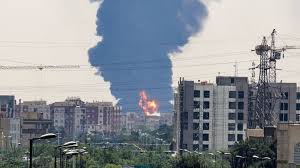Our global economic environment feels more precarious as tensions between Israel and Iran build due to threats to close the Strait of Hormuz and unexpected military confrontations. The effects of these developments extend well beyond the Middle East and have a significant impact on Ghana.
Global Oil Market & Price Volatility
Recent flare-ups have nudged crude oil prices upward. U.S. drivers, for instance, saw Brent rise as tankers rerouted though the rise has been somewhat contained by U.S. shale output and diplomatic interventions (washingtonpost.com).
However, should Iran follow through on threats to close the Strait of Hormuz through which nearly 20% of global oil flows then oil prices could surge dramatically, potentially reaching $100–$150 per barrel (en.wikipedia.org, time.com).
Implications for Ghana
Fuel Price Inflation
As a net importer of petroleum, rising global crude costs translate directly into higher transport, energy, and production costs locally putting strain on Ghanaian households and businesses.
Cedi Depreciation & Rising Debt Burden
Global uncertainty often triggers a shift toward the U.S. dollar, weakening emerging currencies like the cedi. This not only increases the cost of imported goods but also magnifies the cost of servicing Ghana’s USD Foreign-denominated debts.
Inflation & Economic Slowdown
Fuel costs fuel broader inflation raising prices of food and essentials, squeezing disposable income, and potentially slowing economic growth.
Short-Term Opportunity in Gold Exports
Heightened investor demand for safe havens like gold can benefit Ghana which is an exporter of around 4.2 million ounces annually. But any gains from gold exports may be offset by elevated domestic energy costs.
Investor Confidence & Sovereign Risk
Rising oil prices and inflation may cause foreign investors to reassess risk, tighten credit, and push up Ghana’s borrowing costs.
Proactive Measures for Shielding Our Economy
Drawing on global lessons, we believe strategic actions by the government and private investors can strengthen resilience. Here are our top recommendations:
What Government Can Do
- Fuel Price Hedging & Strategic Reserves
Secure forward contracts and build buffer fuel reserves to cushion against sudden price surges. - Monetary & FX Coordination
The Bank of Ghana and Ministry of Finance should coordinate FX policy and be ready to deploy reserves to support the cedi during periods of volatility. - Explore Gold-for-Oil Swaps
Ghana has previously leveraged “gold-backed” oil deals—reviving and refining such mechanisms could help reduce reliance on USD for fuel imports. - Accelerate Renewable Energy Investments
Expand solar, wind, and bioenergy projects to gradually replace fossil fuel dependence and add stability. - Diplomatic Outreach & Security Partnerships
Leverage regional alliances and international diplomacy to ensure safe maritime corridors—especially around the Red Sea and Gulf of Guinea. - Support for Vulnerable Populations
Design temporary relief measures—such as fuel subsidies or transportation support—to buffer low-income households against immediate pump-price spikes.
How Investors Should Position Themselves
- Portfolio Hedging Strategies
Increase allocations to gold or USD-denominated assets; consider inflation-indexed bonds to hedge against currency and price shocks. - Energy Efficiency & Renewable Infrastructure Investments
Support solar installations (rooftops, mini‑grids), energy-efficient logistics, and off-grid solutions—these assets become structurally more valuable as oil rises. - Stress-Test Local Holdings
Simulate scenarios under a 20–50% oil price shock, running sensitivity analyses to understand impacts on returns and leverage. - Monitor Sovereign Risk Signals
Be alert to bond yields, CDS spreads, and Cedi stability—withdraw or hedge exposure if indicators signal rising stress. - Seek Public–Private Partnerships
Collaborate with government agencies to build renewable energy infrastructure—supported by concessional financing, tax incentives, and power purchase agreements.
The evolving Israel–Iran crisis underscores a timeless lesson: geopolitical risks can, and do, reach across continents. For Ghana, oil price shocks are no longer distant ripples they influence our inflation, currency, debt, and voter confidence.
But we’re not powerless. By hedging fuel prices, pursuing gold‑oil swaps, accelerating renewable energy, and building smart investor frameworks, both policymakers and private stakeholders can transform uncertainty into resilience.
EcoCapital Research Desk
Thought leadership on Ghana’s capital markets and economic transformation.
📧 [email protected] | 🌍 www.ecocapinvestment.com










